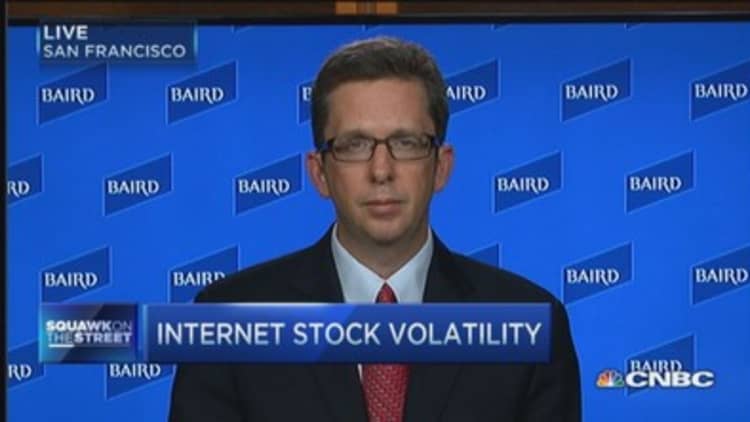
As earnings season winds down, investors can take a step back and examine the major themes driving stock prices up or down. Internet stocks have been affected mainly by increased spending, monetization, active users and online advertising, analyst Colin Sebastian told CNBC on Monday.
"One of the prevailing themes is that spending continues at a pretty high level," the Robert W. Baird analyst told CNBC's "Squawk on the Street." "From that perspective, Amazon actually impressed the Street showing profit margins a bit above expectations. That resulted in the re-rating of the stock being higher."
Amazon's stock was down about 1 percent Monday afternoon, but remains up about 19 percent for the year, according to FactSet.
Read More Michael Kors to join wearable tech movement
Sebastian said Twitter's latest earnings report shows the company's ability to monetize its current user base. "We do sense greater urgency at Twitter in terms of driving more product development and we hope that it ultimately leads to accelerating user growth."
Sebastian also said some Internet stocks, including Yelp, have been hit hard by declining numbers in user growth. "A couple of yellow flags emerged at Yelp that took the wind out of its sails. The sub-sequential decline in active users was one of them," he said. "The company is ratcheting up market spending with the hope of accelerating the user growth."
Read More
Yelp also disappointed investors because of slower local advertising growth, Sebastian added. "Growth in local advertising accounts was below expectations," he said. "The stock will be in the penalty box."
Another theme in play within Internet stocks is the increasing connectivity of home devices to the Internet, Sebastian added. "We think this favors large-platform companies that have the scale and user base already, like Facebook and Google, but also the resources to really go after these growth opportunities," he said. "It's been more of a struggle for the smaller companies [to capitalize on this theme]."


